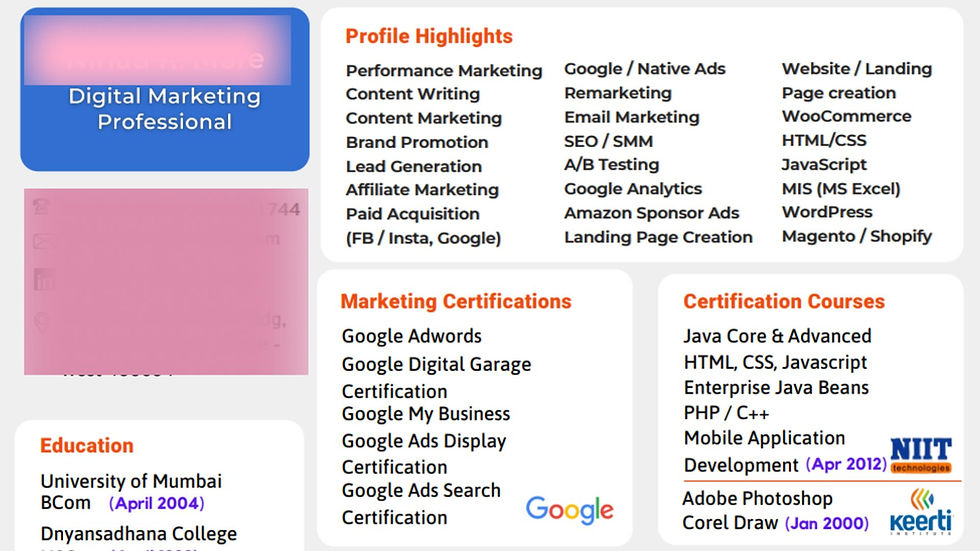Keywords in Resumes wont get you noticed; Your stories will!
- Srikant Subramanian

- Jul 19, 2025
- 4 min read

You’re playing the game.
You write a resume, then you rewrite it.
Then you add keywords—because someone told you to, or because you believe that’s what matters most when it comes to being noticed.
And honestly, I get it.
You’re trying to make it past the filters. The bots. The recruiters with 60 tabs open. You’re told that if your resume doesn’t say “cross-functional,” “strategy,” or “growth” enough times, it won’t even be read.
Somewhere in all of that, you began to just stuff keywords into your resume.
And you stopped writing about yourself.
You stopped telling your story. You also stopped being noticed.
What is keyword stuffing anyway
Keyword stuffing is when you start adding words to your resume—not because you actually did those things, but because you think it’ll help you get through to the next round.
Sometimes it’s technical stuff.
Sometimes it’s business jargon.
Sometimes it’s what you saw in the job description and assumed they wanted to hear.
You’re trying to make your resume resonate with the person who's shortlisting. But when you overdo it, it becomes a problem.
For starters, it makes you look desperate.
And more importantly, anyone who's worked long enough in a company—any company—can smell the fluff.
They know when something’s been written to impress, not to explain.
If you’ve got a sentence in there that says “strategic and agile team player with cross-functional stakeholder management experience”—I promise you, someone is rolling their eyes.
Probably the hiring manager.
Even if the recruiter forwarded you.
It’s the same as calling yourself a “growth hacker” or an “outcome specialist.”
Nobody really knows what that means. And nobody really cares.
You still do it because you think it matters. And it does.
Because honestly, you don’t know what else to do.
You’ve applied where you heard nothing back.
You’ve been told your resume needs the right keywords.
You’ve seen enough advice online telling you to match it to the JD, word for word.
So now you keep staring at your resume and making sure the words “strategy,” “collaboration,” “AI,” “ChatGPT,” “hard work,” “resilience,” and whatever else shows up.
Plus a few of the job-specific ones—
If you’re in marketing, maybe you’ve added “digital,” “SEO,” “content calendar.”
If you’re in IT, it’s “project management,” “scrum,” “Asana,” or whatever else you think they want to see.
You’re not wrong for doing it.
In many ways, the system is set up that way.
But if you think that’s what hiring managers or companies are really looking for—you’re off. That’s not how they decide who to move forward.
We’ll get to that.
But for now, just know this:
You do it because no one told you there’s a better way.
It doesn’t work the way you think it does.
The formatting is clean.
The keywords are there.
You’ve matched the job description as best you can.
However, even the right resume can feel like noise when it's built entirely around keywords and buzzwords—because it doesn't say much about you.
Hiring managers know how to spot a polished but still generic profile.
We see hundreds of them every week.
Thousands, month to month.
The real challenge is to move beyond that sea of sameness.
The keywords aren’t wrong.
But they need to land in a way that actually reflects your work—your context, your voice, your depth.
That’s the difference.
Don’t throw out the keywords. You just need to make them part of your story.
You need to stop letting your keywords lead.
Instead of asking, “Did I use all the right words?”
Start asking, “Does this sound like me?”
Take this line for example: “Leading business analysis for the DIMS product, supporting laboratory data workflows and information management.”
It ticks boxes. It sounds like work.
But what does it really tell you?
Now compare that to this:
“Worked with lab operations teams to redesign how data was tracked across departments, reducing duplicate entries by 30% and speeding up internal reporting cycles.”
The keywords are still there: lab operations, data, reporting.
But now, there’s context. There’s action. There's an outcome.
It sounds like a person—not a brochure.
That’s the shift you need to make.
Use the keywords—but use them in a way that helps someone get what you actually did.
Because if your resume sounds like a job description, you’ll be treated like one of many.
But if it sounds like your work, it’s much easier to remember you.
Find a way to make your story matter
Resumes still matter—for now.
Keywords still matter—for now.
But don’t let that stop you from doing the one thing that actually works:
Telling your story in a way that makes sense to the person reading it.
So go back to your resume.
Keep the keywords.
Just make them yours.
I hope you got something useful out of this.
And if you have thoughts, feedback, or even your own version of this story—I’d love to hear it.
Find me here
https://www.linkedin.com/in/ssrikantsocial or send me an email on srikant@rizzalife.com
Comments